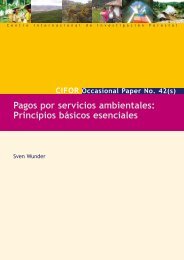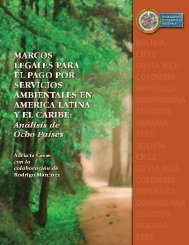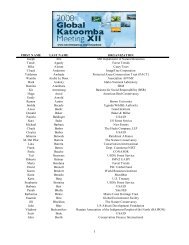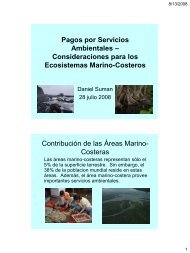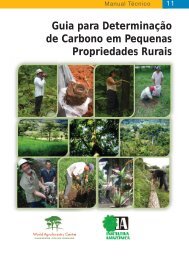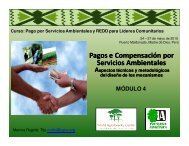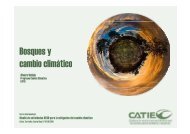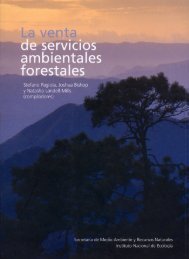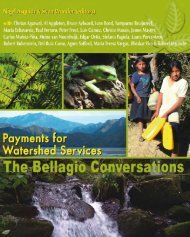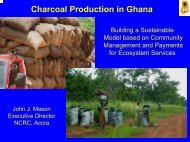Guide on Climate Change and Indigenous Peoples
Guide on Climate Change and Indigenous Peoples
Guide on Climate Change and Indigenous Peoples
- No tags were found...
You also want an ePaper? Increase the reach of your titles
YUMPU automatically turns print PDFs into web optimized ePapers that Google loves.
envir<strong>on</strong>ment <strong>and</strong> natural resources as c<strong>on</strong>tained in Articles 25–30 of the UNDRIP. Whenspecific programs <strong>and</strong> projects affect our l<strong>and</strong>s, territories, envir<strong>on</strong>ment <strong>and</strong> naturalresources, the right of Self Determinati<strong>on</strong> of <strong>Indigenous</strong> <strong>Peoples</strong> must be recognized<strong>and</strong> respected, emphasizing our right to Free, Prior <strong>and</strong> Informed C<strong>on</strong>sent, includingthe right to say “no”. The United Nati<strong>on</strong>s Framework C<strong>on</strong>venti<strong>on</strong> <strong>on</strong> <strong>Climate</strong> <strong>Change</strong>(UNFCCC) agreements <strong>and</strong> principles must reflect the spirit <strong>and</strong> the minimum st<strong>and</strong>ardsc<strong>on</strong>tained in UNDRIP.Calls for Acti<strong>on</strong>1. In order to achieve the fundamental objective of the United Nati<strong>on</strong>s FrameworkC<strong>on</strong>venti<strong>on</strong> <strong>on</strong> <strong>Climate</strong> <strong>Change</strong> (UNFCCC), we call up<strong>on</strong> the fifteenth meeting of theC<strong>on</strong>ference of the Parties to the UNFCCC to support a binding emissi<strong>on</strong>s reducti<strong>on</strong> targetfor developed countries (Annex 1) of at least 45% below 1990 levels by 2020 <strong>and</strong> at least95% by 2050. In recognizing the root causes of climate change, participants call up<strong>on</strong>States to work towards decreasing dependency <strong>on</strong> fossil fuels. We further call for a justtransiti<strong>on</strong> to decentralized renewable energy ec<strong>on</strong>omies, sources <strong>and</strong> systems owned<strong>and</strong> c<strong>on</strong>trolled by our local communities to achieve energy security <strong>and</strong> sovereignty.In additi<strong>on</strong>, the Summit participants agreed to present two opti<strong>on</strong>s for acti<strong>on</strong>: somesupported opti<strong>on</strong> A <strong>and</strong> some opti<strong>on</strong> B. These are as follows:A. We call for the phase out of fossil fuel development <strong>and</strong> a moratorium <strong>on</strong>new fossil fuel developments <strong>on</strong> or near <strong>Indigenous</strong> l<strong>and</strong>s <strong>and</strong> territories.B. We call for a process that works towards the eventual phase out of fossilfuels, without infringing <strong>on</strong> the right to development of <strong>Indigenous</strong> nati<strong>on</strong>s.2. We call up<strong>on</strong> the Parties to the UNFCCC to recognize the importance of our Traditi<strong>on</strong>alKnowledge <strong>and</strong> practices shared by <strong>Indigenous</strong> <strong>Peoples</strong> in developing strategies toaddress climate change. To address climate change we also call <strong>on</strong> the UNFCCC torecognize the historical <strong>and</strong> ecological debt of the Annex 1 countries in c<strong>on</strong>tributing togreenhouse gas emissi<strong>on</strong>s. We call <strong>on</strong> these countries to pay this historical debt.3. We call <strong>on</strong> the Intergovernmental Panel <strong>on</strong> <strong>Climate</strong> <strong>Change</strong> (IPCC), the MillenniumEcosystem Assessment, <strong>and</strong> other relevant instituti<strong>on</strong>s to support <strong>Indigenous</strong> <strong>Peoples</strong> incarrying out <strong>Indigenous</strong> <strong>Peoples</strong>’ climate change assessments.4. We call up<strong>on</strong> the UNFCCC’s decisi<strong>on</strong>-making bodies to establish formal structures<strong>and</strong> mechanisms for <strong>and</strong> with the full <strong>and</strong> effective participati<strong>on</strong> of <strong>Indigenous</strong> <strong>Peoples</strong>.Specifically we recommend that the UNFCCC:a. Organize regular Technical Briefings by <strong>Indigenous</strong> <strong>Peoples</strong> <strong>on</strong> Traditi<strong>on</strong>alKnowledge <strong>and</strong> climate change;b. Recognize <strong>and</strong> engage the Internati<strong>on</strong>al <strong>Indigenous</strong> <strong>Peoples</strong>’ Forum <strong>on</strong><strong>Climate</strong> <strong>Change</strong> <strong>and</strong> its regi<strong>on</strong>al focal points in an advisory role;c. Immediately establish an <strong>Indigenous</strong> focal point in the secretariat of theUNFCCC;d. Appoint <strong>Indigenous</strong> <strong>Peoples</strong>’ representatives in UNFCCC fundingmechanisms in c<strong>on</strong>sultati<strong>on</strong> with <strong>Indigenous</strong> <strong>Peoples</strong>;e. Take the necessary measures to ensure the full <strong>and</strong> effective participati<strong>on</strong>of <strong>Indigenous</strong> <strong>and</strong> local communities in formulating, implementing, <strong>and</strong>m<strong>on</strong>itoring activities, mitigati<strong>on</strong>, <strong>and</strong> adaptati<strong>on</strong> relating to impacts ofAnnexes 179



